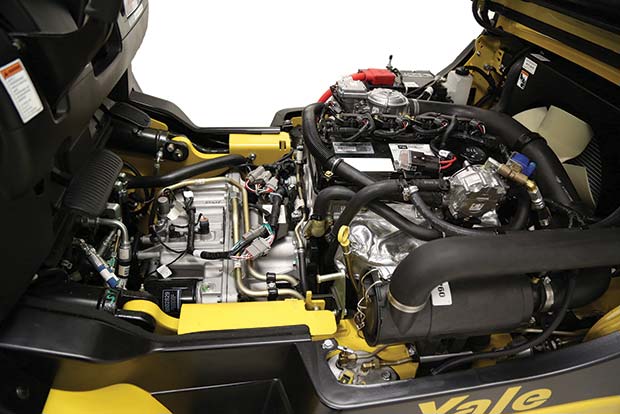Yale has announced the completion of an engine alteration programme across its entire 2.0 to 3.5 tonne LPG counterbalance forklift truck range, in which true industrial engines have taken over from automotive-derived units.

The changes offer customers a more powerful and efficient engine with improved productivity while lowering the total cost of ownership.
For its feature-rich GLP20-35VX series, its standard-duty GLP20-25LX and its compact GLC20-35VX trucks, Yale has chosen to replace the previous Mazda 2.2 litre engine with a 2.4 litre PSI (Power Solutions International) alternative.
Matthew Allen, Yale solutions manager counterbalance product, explains: “Compared to their automotive-derived equivalents, industrial engines in lift trucks are more powerful, fuel efficient, quiet, reliable and long-lasting. Much of this is down to the fact that they operate at lower RPM and this gives significantly more low-end torque – which is ideal in materials handling.
“Yale has worked with PSI for more than two and a half years to develop engines that are tailored to meet the demands of each application, incorporate the latest technologies for peak performance and surpass the performance of previous engines.
“Over 30,000 hours of testing, incorporating a series of simulations, reliability measurements and engine dyno testing, have been completed on the new engine and after each highly accelerated life test (HALT) the engines were disassembled and inspected to verify that they continued to meet durability expectations.”
Explaining the alternative testing to measure fuel efficiency and productivity, Matthew adds: “We used multiple tests to measure fuel consumption of the new PSI 2.4L LPG engine. In addition to the industry standard VDI 2198 light duty test course we also included a productivity test to better reflect the heavy duty cycle environment our trucks perform every day. The VDI test does not allow the RPMs to reach the level necessary to fully compare the performance capabilities of the different model settings offered on Yale VX series trucks. What’s more, we know our customers aim to move as many loads as quickly and efficiently as possible so in our tests operators moved as many loads as possible within the test cycle parameters to allow us to compare loads moved per hour and fuel used per hour.”
Measuring efficiency in terms of loads moved per kg of fuel used, the PSI 2.4 litre engine is 26% better than the engine it has replaced in the GLP20-25LX series. By the same measure, the GLP20-35VX series (GLP25VX model) has improved by 24%.
“The economy figures speak for themselves,” explains Matthew. “And by giving customers a wide choice of engines and specification levels we are ensuring that performance and other qualities can be matched closely to the needs of each application. Our dealers will identify the perfect combination of economy and productivity in every case.”
PSI engine benefits
In comparison to previous engines, the 2.4L PSI LPG engine offers a number of benefits to both the operator and the fleet manager, including reduced noise levels and improved serviceability.
“Noise levels have been significantly reduced to 77dB(A) in high performance (HiP) mode, enhancing operator comfort and productivity over the length of the shift. Furthermore, serviceability is improved by using a coil over plug ignition design – no plug wires to lose the spark and require replacement – using hydraulic valve lifters to eliminate 1000 hour valve adjustment and extending the camshaft belt replacement interval from 3500 to 5000 hours.
Together with other enhanced features of the PSI engines – Including their high-durability cylinder head design and the premium intake and exhaust valve seat inserts for improved valve train life – the premium, long-life (5,000 hours) timing and balance shaft belts, are exclusive to PSI.




Comments are closed.